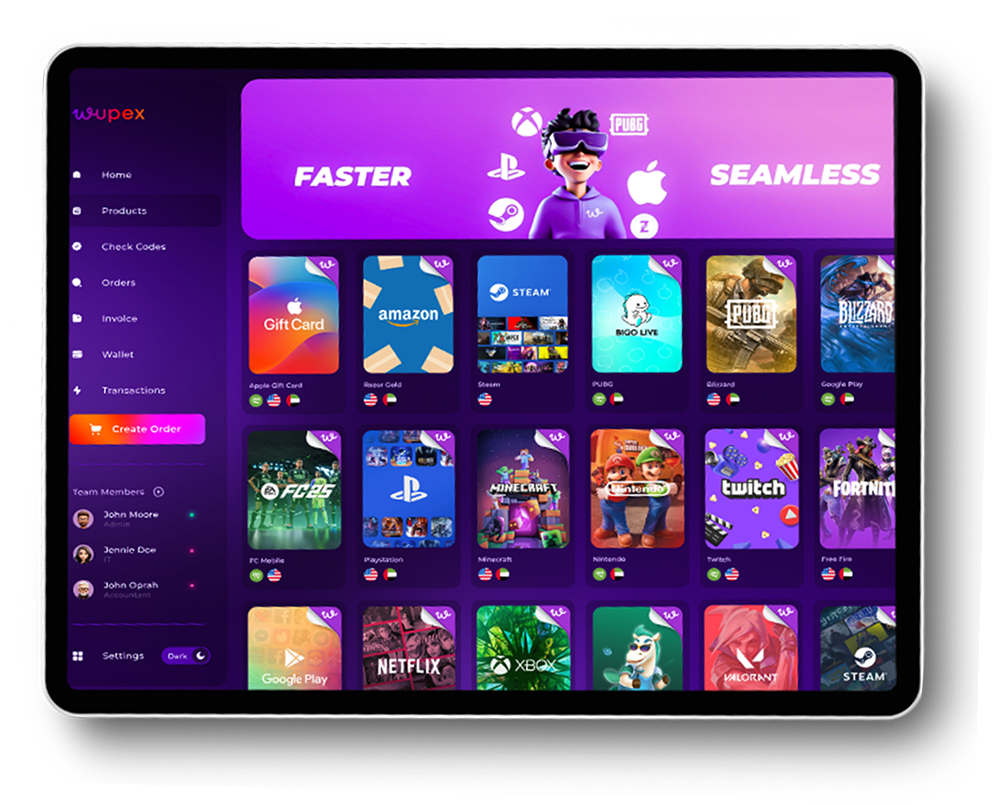API Development And
Integration Guide
Filtering & Pagination
Efficient filtering and pagination are key to handling large product catalogs and order histories in WUPEX. This section illustrates best practices to enhance performance and user experience.
Pagination Standards
Request Body:
{
"page": 1, // Start from page 1
"pageSize": 20 // Up to 100 items per page
}
Response (Sample):
{
"pageInfo": {
"totalPage": 5,
"totalCount": 95,
"pageSize": 20,
"currentPage": 1
},
"data": [ … ],
"status": true
}
- totalCount indicates total available records.
- totalPage is calculated as ceil(totalCount / pageSize).
- Always validate currentPage to prevent out-of-range requests.
Why It Matters:
Large datasets impact performance and UX. Break data into smaller chunks for faster loading and responsive designs.
Filtering Requests
Typical Filter Payload:
{
"page": 1,
"pageSize": 20,
"search": [
{
"column": "productType",
"operator": "Equals",
"value": "Google Play"
}
]
}
Use Cases:
- Filter products by region: productType = Apple iTunes
- Filter orders: by OrderName or ReferenceId
- Sort results: e.g., by order date or product name
Best Practices
- Default Reasonable Limits
Provide sensible defaults (e.g., page 1, size 20) to avoid empty or excessively large responses.
- Include Clear Metadata
Always return pagination info—totalPage, totalCount, etc.—for UI navigation
- Stable Sorting
Ensure consistent sorting (e.g., by productCode or orderDate) so pagination doesn’t skip or repeat items .
- Handle Edge Cases Gracefully
Return an empty list with pageInfo when page exceeds total pages. Include helpful error messages for invalid input
- Rate Limit & Performance Awareness
Pagination reduces overhead. Help developers avoid performance issues by discouraging fetching full datasets without limits
Pro Tips
- Combine filters with pagination (e.g., product type + page number) to reduce payload size.
- Implement client-side caching for previously loaded pages to prevent duplicate fetches.
- For dynamic filters (price range, popularity), combine API filters with client-side logic for smooth UX.
- Provide users with UI controls: “Previous / Next page,” current “Page x of y,” and pageSize options.
Get Started
Product API
Order API
Customer API
Common Parameters & Headers
Error Handling & Status Codes (Optional)
Postman Collection & Tools (Optional)

Let’s Boost Your
Business Efficiency
Say goodbye to delays, fraud, and complex setups—our solution is built for speed and trust.
Get Latest News for Free!
exclusive API insights
Why WUPEX?
Partners
- Apple
- PSN
- Razer Gold
- Xbox
- PUBG
- Steam
- Jawaker
- Roblox
- Fornite
- Minecraft
- Yalla Ludo
- FC Mobile
- Freefire
Industries
- Banks & Fintech
- Retail & eCommerce
- Payment Gateways
- Telecom & Wallets
- Gaming & Esports
- Corporate Gifting
Resources
- Blog
- FAQ
Company
- About Us
- Meet Our Team
- Contact Us
- Partnership
- Terms & Conditions
Downloads
- Catalogue
- Company Profile
- API Documentation
Features
- Seamless Integration
- Secured API
- Real-Time Delivery
- Bulk Digital Gift Cards
- Fraud Prevention
- Global Brand Access
Support
- Get Started
- Customer Support
- Portal Guide
- API Integration Guide
- Help Center
Copyright © 2024 WUPEX | All Rights Reserved.
Why WUPEX?
Partners
- Apple
- PSN
- Razer Gold
- Xbox
- PUBG
- Steam
- Jawaker
- Roblox
- Fornite
- Minecraft
- Yalla Ludo
- FC Mobile
- Freefire
Industries
- Banks & Fintech
- Retail & eCommerce
- Payment Gateways
- Telecom & Wallets
- Gaming & Esports
- Corporate Gifting
Features
- Seamless Integration
- Secured API
- Real-Time Delivery
- Bulk Digital Gift Cards
- Fraud Prevention
- Global Brand Access
Support
- Get Started
- Customer Support
- Portal Guide
- API Integration Guide
- Help Center
Company
- About Us
- Meet Our Team
- Contact Us
- Partnership
- Terms & Conditions
Resources
- Blog
- FAQ
Downloads
- Catalogue
- Company Profile
- API Documentation
Copyright © 2024 WUPEX | All Rights Reserved.


